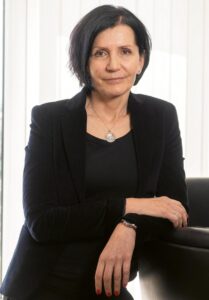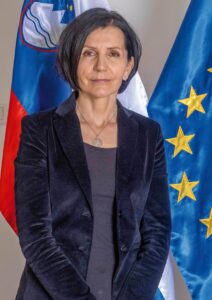Interview with H. E. Ms Bernarda Gradišnik Ambassador of the Republic of Slovenia to Montenegro
As Montenegro continues its path toward European integration and deepens its diplomatic ties within the region, the relationship between the Republic of Slovenia and Montenegro stands as a beacon of mutual respect, cooperation, and shared values. Since taking office a year ago, H.E. Ms. Bernarda Gradišnik, Ambassador of the Republic of Slovenia to Montenegro, has worked tirelessly to further strengthen this bond, enhancing bilateral cooperation in numerous areas, from politics and economics to culture and environmental sustainability. In this interview for our magazine, Ambassador Gradišnik shares her insights on the excellent relations between the Republic of Slovenia and Montenegro, highlighting key projects, ongoing initiatives, and the potential for future collaboration.

Ms Gradišnik, you have been the Ambassador of the Republic of Slovenia in Montenegro for a year. How do you assess the current bilateral relations between the Republic of Slovenia and Montenegro, and in which areas do you see the greatest potential for further enhancement of cooperation?
Political relations are excellent, we are in a way as neighbours, in fact, even better than immediate neighbours are, since there are always some outstanding issues between countries who share their frontier, but there is none between Slovenia and Montenegro. In addition, I have to say, our relations are quite active. This is evidenced by the many visits in both directions. Not only at the highest state level. There are many contacts in various fields. Slovenian institutions, experts, artists, businesspersons cooperate with Montenegrin counterparts almost on a daily basis.
Of course, we pay special attention to economic cooperation. As regards trade in goods, there are still many opportunities on offer. In the energy sector, I see opportunities in renewable energies. There is also the food industry, tourism, there is a great interest on your part in rural tourism, where there is a great potential, and there is also the area of digitalisation.
Slovenian investors have been present and active in Montenegro for many years now. I’m confident that there would be even more of them if the business and investment environment in Montenegro would be more predictable. In this regard, I would also like to emphasize the importance of the effective and functional rule of law.
I would like to see a strengthening of cooperation in the cultural field also. The space above our heads is very interesting and increasingly important. I have read that Montenegro is planning to launch its own satellite into orbit by the end of the year, and Slovenia’s achievements in this area are excellent. Our embassy have already connected Slovenian and Montenegrin space sector, now it’s up to them to continue the cooperation.
What are the key initiatives and projects that the Embassy of the Republic of Slovenia is currently implementing in Montenegro and which contribute to strengthening the economic and cultural ties between our countries?
The main task of the Embassy is to protect the national interests, the rights and interests of Slovenian citizens, as well as of the Slovenian economy. The Embassy also helps Slovenian companies, for example, when they want to introduce practices that will become mandatory with Montenegro’s EU membership.
The main economic project the Embassy is currently working on is the promotion of Slovenian products. In the year since I have been here, I have noticed that there are not so many Slovenian products available on the shelves of shops, but from talking to people, it is clear that Slovenian products are very appreciated and that people would like to see more of them. So we are collaborating with Voli to give people the opportunity in December to get to know Slovenian products that are not yet on the Montenegrin market. As every year, we will participate in the charity diplomatic bazaar with Slovenian products. In November Gregor Vračko, a Slovenian chef from the restaurant with Michelin star will be presenting his cuisine in hotel Cattaro in Kotor.
One important project is also funded by our development aid. A kindergarten in the centre of Podgorica will be greened, cycle tracks will be built, NLB will facilitate the purchase of bicycles, and ecological playsets will also be installed. We are implementing this project in cooperation with our local partners in Podgorica.
In the field of culture, I would like to mention the Laibach exhibition, in which we work together with the Museum of Contemporary. The exhibition will take place in Podgorica from November to January next year.

What is the Republic of Slovenia’s position on the European integration process of the Western Balkans, and how do you see Montenegro’s role in that process?
As you know, Slovenia is a strong supporter of the integration of the Western Balkan countries, including Montenegro, into the EU. We would like this to happen as soon as possible.
The portfolio given to us by the European Commission after this year’s elections has confirmed this. Of course, each candidate country has to do its “homework”. With concrete results, our job is or will be easier. We are all well aware that Montenegro is a leader in European integration and can always count on Slovenia’s help and support along the way. I can say with certainty that this will continue to be the case.
I believe that there is a real chance that you will become the 28th EU Member State in 2028. If Montenegro continues in this direction and with this enthusiasm, I see no danger of a setback.
You have received the famous IBAR, and this is a turning point that will change a great deal for the EU, which is aware of the geostrategic importance of Montenegro and the Western Balkans as a whole. But everyone, I say again, has to do one’s part, and that goes for the EU and for Montenegro too. The new government and parliament have shown, with concrete and measurable results, how much they are aware of this, and it is clear to the government that this is only the beginning of a challenging process. IBAR opens the door to the EU for Montenegro, the country that clearly is an example of stability in the Western Balkans.
Slovenia will continue to stand with Montenegro on its path to the EU. We look forward to working with you in the EU framework as well.
In your opinion, how can smaller countries like the countries of the former Yugoslavia contribute to solving global challenges, such as climate change and international security, through their diplomacy?
Every piece in the mosaic, no matter how big or small, contributes to the whole picture. Small countries can achieve things more easily when they join together in a common project, but it is actually the interest rather than their smallness that binds such countries together. Smallness does not stop us from endeavouring. And if we endeavour, we can do something. Slovenia is aware of the fact that it is not big enough to be everywhere and to reach out to everyone. But the list of things we’ve been doing successfully is nevertheless quite a long one, covering different fields – from participating in peacekeeping missions, development aid, protection of civilians and human rights to climate and security, water as well as food security diplomacy.
By weaving a net of international partnerships and friendly relations that could cope with the new global challenges, Slovenia is helping create a globalized commonwealth where even the smallest members can participate – actively and with honour.
It is obvious that we live in time of enormous world challenges. How do you see the role of multilateral organizations, such as the United Nations and the European Union, in maintaining global stability, and what can be done to make them more effective in today’s geopolitical landscape?
You have actually answered the question yourself. I think that multilateralism is important, especially for small countries; unfortunately, it is not effective enough. What to do? UN reform has been on the agenda for years but nothing has moved forward. Geopolitics has changed, but the UN remains as it was.
Slovenia, as a non-permanent member of the UNSC, for the second time, aims further to build trust among the UN members. This is what we can do even though the situation does not seem to be very promising. There looms a chance of splitting the organization into two opposing parts, the global West and the Global East (with a lot of the South included). How will this end? I do not know. We can wait and see or each of us small entities do our tiny bits in trying to save the world.